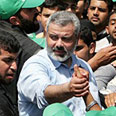
Immediately following Hamas' election victory in January, three main demands were made of the Palestinian Authority: Recognize Israel, honor agreements signed by the previous government, and refrain from violence. An international coalition was formed to pressure Hamas into accepting these demands, and the campaign was slated to include a total rejection of Hamas representatives in international politics, and stopping the flow of international aid that funds the PA.
But the pressure does not seem to have worked. Hamas has not disappeared or moderated, mainly because there is no way to differentiate between "permitted" humanitarian aid and "prohibited" aid. In addition, PA leader Mahmoud Abbas is the international face of the Palestinians, and Israel has been unsuccessful in persuading the world to stop supporting groups directly or indirectly associated with Abbas.
However, the economic boycott has yielded a different result, not necessarily positive, with regard to Washington's standing in the region.
Changing reality
Since the 1970s, and especially since the end of the Cold War, the United States has enjoyed a special standing with regard to the diplomatic process. Both Israel and the Arabs have agreed to U.S. mediation, and other countries – mainly in Europe – have been pushed aside, and their roles have been limited to providing economic support.
Today, different players are using the opportunity presented by Hamas' victory to establish their diplomatic influence by using their economic prowess, by challenging the United States' special standing in the region. For instance, the election of Hamas does not automatically mean the Palestinians will be forced to do without economic help from the Arab states, Iran, Russia, and even France.
Quite to the contrary: Many countries, including the European Union, see the current situation as an opportunity to force their way into Israel-Palestinian relations, and to challenge American diplomacy by developing independent relations with the Palestinian Authority.
Therefore, an Israeli move, based on the ability to build and maintain an international coalition against Hamas on the basis of economics, will drive us into a trap: On one hand, the more extreme claims become, the more the coalition can be expected to crumble. Secondly, being flexible will stabilize the coalition, but would require Israel and the United States to tone down their demands of Hamas.
Where to now?
If this is so, what should Israel do? The government must proceed with its stated goal – ending Israel's rule over the Palestinians.
The basic principles of Ehud Olmert's government call for initial negotiations with the Palestinians, based on the above mentioned demands of the Hamas government. If this does not happen - as is expected, as long as Hamas remains a significant political player – "Israel will take its fate in its own hands."
That is to say: The "convergence" plan will be carried out. Or then, a Hamas-led government and legislative council will allow Israel to justify its moves, and will be forced to move towards establishing a broad, stable international coalition.
The day after
One way to ensure this would be to link the convergence plan to a broader strategy that would include plans for the day after. In other words, it must be clear to all that Israel is acting in concert with the principle "two states for two peoples," and must transfer responsibility for the territories it abandons – to Hamas.
In this way, the Bush administration will be able to show significant progress towards that goal before the end of his term in office, while the European Union will continue to see an opportunity to deepen its involvement in the region.
And for Hamas, it will be an opportunity to choose between the welfare of ordinary Palestinians and its ideology.
Omri Dagan is the Analysts Team leader at the Reut Institute.















